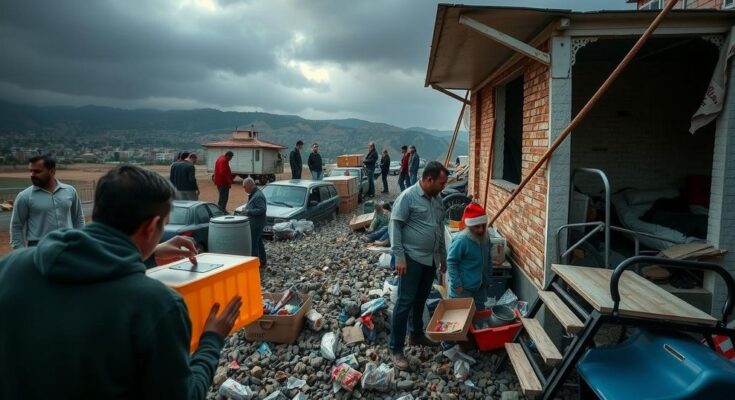Syrians in Lebanon, already displaced by the civil war, face a new crisis as hostilities between Israel and Hezbollah lead to increased displacement. Many are unable to return to Syria due to fears of conscription and hostility in Lebanon. With over 1.2 million people displaced since October 2023, the UNHCR reports that Syrian refugees are struggling for shelter and services amid Lebanon’s economic crisis.
Amidst the ongoing conflict in Lebanon, more than a million Syrians, already displaced by the prolonged civil war in their homeland, are grappling with a second displacement as hostilities intensify between Israel and Hezbollah. Many of these refugees, who cannot return to Syria due to fears of conscription or persecution, face the harsh realities of extreme poverty and rising local hostility. Following escalated Israeli airstrikes that targeted Hezbollah positions starting in early October 2023, the UNHCR reported that 34,000 Syrians have been further displaced, adding to the over 1.2 million individuals affected overall. The situation is exacerbated by Lebanon’s deteriorating economic conditions, where displaced Syrians struggle to gain access to shelter, work, and essential services due to widespread anti-Syrian sentiment. The Lebanon conflict, ignited by Hezbollah’s military actions along the Israeli border in October 2023, has led to a desperate plight for the Syrian diaspora. Reports indicate that many Syrians find themselves homeless, forced to sleep in public spaces, and denied municipal registration in preference to Lebanese nationals. UNHCR spokesperson Lisa Abou Khaled emphasized, “Refugees who have fled their homeland in search of safety and security are now facing the reality of being displaced once again in Lebanon due to ongoing hostilities. This double displacement exacerbates their vulnerability.” The increasing violence has prompted many Syrians, at least 70 percent of the recent wave of displaced individuals, to return to the relatively calmer borders of Syria despite significant risks. Nevertheless, for numerous displaced families like Rabab’s, returning home remains impossible due to the absence of family support and the looming threat of conscription. Humanitarian organizations are striving to provide essential assistance, but barriers remain, with municipalities often citing overcrowding as a reason for denying shelter to displaced Syrians. The socioeconomic plight of both Lebanese citizens and Syrian refugees has fanned the flames of conflict, leading to discriminatory practices against Syrians seeking refuge in their host country. As Lebanon grapples with a severe economic crisis and enduring social tensions, the humanitarian situation for Syrians remains critical. Hector Hajjar, Lebanon’s caretaker minister of social affairs, claimed that efforts are being made to safeguard all affected communities, stressing that his government is not ignoring the needs of Syrian refugees. The UNHCR continues to advocate for equitable assistance and access to protection for all displaced individuals in Lebanon, underscoring the necessity for both Lebanese and Syrian communities to receive equal treatment and dignity in the face of adversity. This ongoing struggle highlights a complex web of humanitarian challenges where structural issues must be urgently addressed amid a backdrop of geopolitical tensions and local rivalries.
The plight of Syrians in Lebanon is situated against the backdrop of ongoing regional conflict. Following the outbreak of the Syrian civil war in 2011, Lebanon has seen an influx of over 1.5 million Syrian refugees. The recent escalation of hostilities between Israel and the Iran-aligned Hezbollah militia has further exacerbated this crisis, leading to a new wave of displacement within Lebanon. The humanitarian strain is compounded by Lebanon’s extensive economic challenges, which have severely impacted both Lebanese citizens and refugees, creating an environment of competition for resources and safety. Amid these circumstances, humanitarian organizations like UNHCR are actively working to address the urgent needs of displaced individuals while advocating for equitable access to assistance amidst rising hostility.
The humanitarian crisis for Syrians in Lebanon is deepening due to the renewed hostilities with Israel, forcing many into a precarious second displacement amidst economic strife and societal tensions. The UNHCR and other organizations are tirelessly working to provide support and shelter to these vulnerable populations, but structural challenges and discriminatory practices continue to hinder their efforts. Urgent action and compassion are necessary to address the needs of all displaced individuals while promoting dignity and respect during these challenging times.
Original Source: www.arabnews.com




